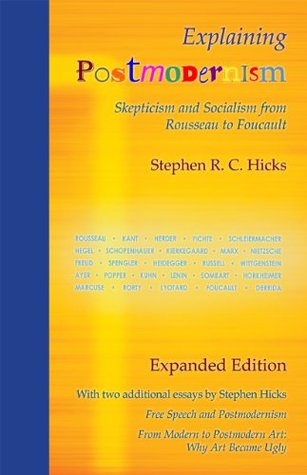More on this book
Community
Kindle Notes & Highlights
Read between
December 12, 2024 - March 27, 2025
Modern thinkers emphasize the individual, seeing the individual as the unit of reality, holding that the individual’s mind is sovereign, and that the individual is the unit of value—in contrast to the pre-modernist, feudal subordination of the individual to higher political, social, or religious realities and authorities.
If one emphasizes that reason is the faculty of understanding nature, then that epistemology systematically applied yields science. Enlightenment thinkers laid the foundations of all the major branches of science.
Modern philosophy matured in the 1700s until the dominant set of views of the era were naturalism, reason and science, tabula rasa, individualism, and liberalism.
Postmodernism rejects the reason and the individualism that the entire Enlightenment world depends upon. And so it ends up attacking all of the consequences of the Enlightenment philosophy, from capitalism and liberal forms of government to science and technology.
the three men, all of them English, most often identified as being most influential in making the Enlightenment possible are: Francis Bacon, for his work on empiricism and scientific method; Isaac Newton, for his work on physics; and John Locke, for his work on reason, empiricism, and liberal politics.
Kant is sometimes considered to be an advocate of reason. Kant was in favor of science, it is argued. He emphasized the importance of rational consistency in ethics. He posited regulative principles of reason to guide our thinking, even our thinking about religion. And he resisted the ravings of Johann Hamann and the relativism of Johann Herder. Thus, the argument runs, Kant should be placed in the pantheon of Enlightenment greats.[27] That is a mistake.
The fundamental question of reason is its relationship to reality. Is reason capable of knowing reality—or is it not?
Kant was crystal clear about his answer. Reality—real, noumenal reality—is forever closed off to reason, and reason is limited to awareness and understanding of its own subjective products.
This meant that reason had to be put in its proper, subordinate, place. And so, as he stated famously in the Second Preface to the first Critique, “I here therefore found it necessary to deny knowledge in order to make room for faith.”[30]
If reason could be shown to be limited to the merely phenomenal realm, then the noumenal realm—the realm of religion—would be off limits to reason, and those arguing against religion could be told to be quiet and go away.[31]
The rationalists, agreeing that necessary and universal concepts could not be derived from sense-experience—but insisting that we do have necessary and universal knowledge—had concluded that our concepts must have a source somewhere other than in sense-experience.
The question to return to is: Is there not something perverse about making our organs of consciousness obstacles to consciousness?[45]
Any thinker who concludes that in principle reason cannot know reality is not fundamentally an advocate of reason.
With Kant, then, external reality thus drops almost totally out of the picture, and we are trapped inescapably in subjectivity—and that is why Kant is a landmark. Once reason is in principle severed from reality, one then enters a different philosophical universe altogether.
Kant’s contemporary Moses Mendelssohn was thus prescient in identifying Kant as “the all-destroyer.”[46]
Kant made the subject responsible only for the phenomenal world of experience, leaving noumenal reality forever closed off to us.


